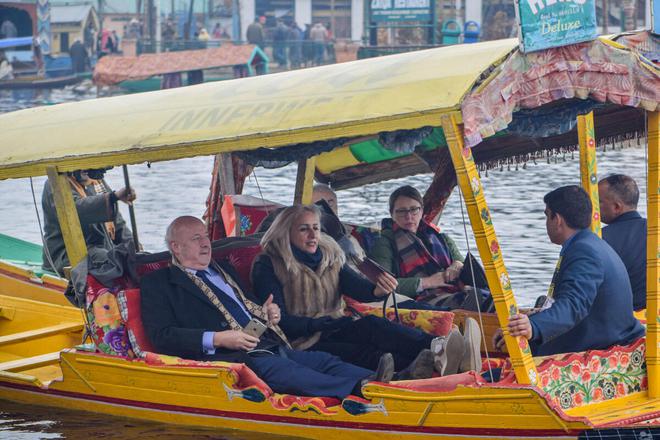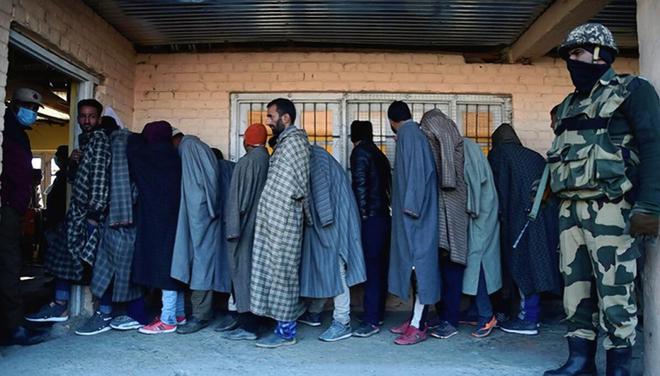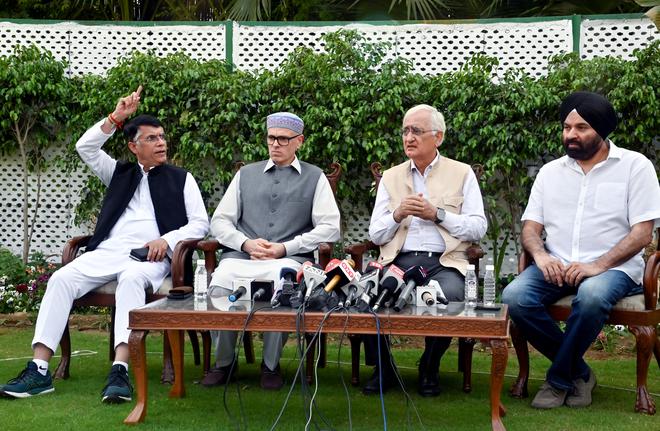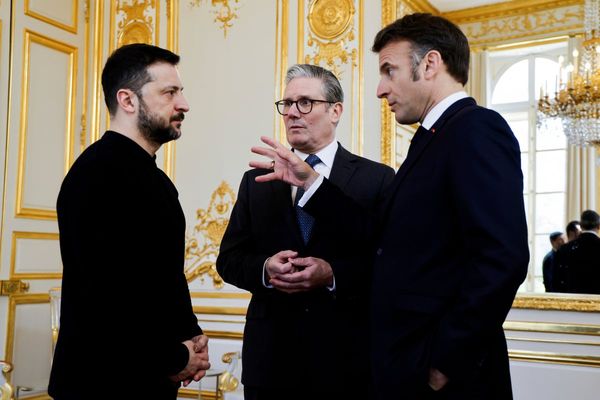India’s newest Union territory Jammu & Kashmir (J&K) will vote for its five constituencies in five phases in the ongoing Lok Sabha elections. In the fray are the Bharatiya Janata Party (BJP) and its prime Opposition – The People’s Alliance for Gupkar Declaration (PAGD) – a collection of political parties in J&K seeking restoration of the hilly state’s special status in Article 370 and Article 35A of the Indian Constitution.
However, the PAGD seems likely to fall apart, with its biggest members the Jammu & Kashmir National Conference (NC) and the Jammu & Kashmir People’s Democratic Party (PDP) pitted against each other in Anantnag-Rajouri, Srinagar, and Baramulla. Both national parties BJP and Congress have decided to not field any candidates for these three seats.
Here’s a look at the PAGD’s formation, aim, electoral success and current breakdown
Gupkar declaration, detention & PAGD formation
Shortly after Prime Minister Narendra Modi was re-elected for a second term in 2019, three main events occurred in the Kashmir Valley, triggering alarm bells among locals and J&K politicians alike. First, the Centre initiated a massive deployment of security forces (approximately 50,000) personnel to the Valley stating security concerns amid the Amarnath Yatra in July 2019. Second, the Amarnath Yatra was abruptly cut short on July 31, 2019 and tourists were asked to leave citing terror threats. Stranded tourists were immediately air-lifted from the Valley by the Army. Third, J&K authorities issued advisories about the imposition of night curfew, closure of schools and colleges, and imposition of Section 144 of the India Penal Code on August 4, 2019.
Fearing the revocation of J&K’s special status, ex-Chief Ministers Farooq Abdullah and Mehbooba Mufti convened a meeting at the former’s home — Gupkar Residence, on August 4, 2019, to discuss the changes afoot in the Valley. The meeting was attended by NC’s Omar Abdullah, Nasir Sogami and Ali Mohammad Sagar, PDP’s Muzaffar Hussain Beg, Abdul Rehman Veeri and Suhai Bukhari, J&K People’s Conference’s (PC) chairman Sajad Ghani Lone and members Abdul Ghani Vakeel and Imran Reza Ansari, M.Y. Tarigami from the Communist Party of India (Marxist) [CPI (M)], J&K Congress’ Taj Mohiudin, and other leaders such as Shah Faesel, Muzaffar Shah and Uzair Ronga.
In the meeting, a unanimous resolution, titled the Gupkar Declaration, was passed to protect and defend the identity, autonomy and special status of J&K, deem the abrogation of Articles 35A, 370, or any delimitation or trifurcation of the State as an aggression against the people and seek an audience with the President and Prime Minister of India to safeguard interests of the people of J&K.
Later that night, most of the above-mentioned leaders were placed under house arrest and the entire State was put under curfew, with a shutdown of internet services and severe restrictions on gatherings and people’s movement.
On August 5, 2019, President Ram Nath Kovind invoked Article 370 (3) and issued an order stating that all provisions of the Constitution of India would apply to J&K, superseding the 1954 Presidential order. On the same day, the Jammu & Kashmir Reorganisation Bill, 2019 was introduced, debated and passed by the Rajya Sabha. A day later, it was passed by the Lok Sabha and the President issued another order deeming all clauses except clause 1 of Article 370 to be inoperative, thus completing the process of revoking J&K’s special status and bifurcating the state into two Union territories – Jammu and Kashmir (with an Assembly) and Ladakh (no Assembly).

As the curfew, political incarceration and internet shutdown in J&K continued (reinforced due to the spread of COVID-19), several foreign envoys were invited at the behest of the Centre to show the ‘normal’ on-ground situation in the Valley amid global outcries against the revocation of Article 370. Senior PDP leader Altaf Bukhari, one of the few J&K politicians not to be incarcerated, attended a meeting with these envoys, prompting his immediate expulsion from PDP.
Soon after, on March 8, 2020, Mr. Bukhari along with thirty other PDP and Congress leaders split away to form the J&K Apni Party in March 2020. The party met with then-J&K governor G. C. Murmu and demanded jobs in J&K be reserved for locals, restoration of domicile rights of J&K and extension of Article 371 of the constitution to J&K. The softer stance of the party with respect to J&K’s autonomy has attracted allegations that it toes BJP’s line in J&K.
On March 13, 2020, the first politician to be released from detention was NC chief Farooq Abdullah, followed by his son and ex-CM Omar Abdullah and finally in October 2020, PDP chief Mehbooba Mufti.
After the Abdullahs’ release, on August 22, 2020, a formal alliance between six political parties was announced to carry forward the fight for J&K’s special alliance. Dubbed the People’s Alliance for Gupkar Declaration (PAGD), the members included NC, PDP, PC, Congress, CPI (M) and the Awami National Conference (ANC). Citing the Gupkar Declaration, the PAGD vowed to focus all its political activities to achieve the ‘sacred goal of reverting to the status of J&K as it existed on 4th August 2019.’
Ruptures in PAGD & electoral foray
The newly-stitched alliance began unravelling soon after. On November 17, 2020, the Congress stated that it was not part of the PAGD and “would never compromise on the country’s territorial integrity.” The party also distanced itself from Mr. Abdullah’s statement that if Kashmir wanted to go with Pakistan, it would have done so in 1947 and no one would have stopped it. Ms. Mufti also invited Congress’ ire when she said that she will only hold the national flag after the flag of J&K is restored.
While the party denied any involvement in the Gupkar declaration, it joined hands with the alliance for the maiden District Development Council (DDC) polls held on November 28 and December 19, 2020. Running a political campaign amid stringent restrictions, the alliance emerged victorious, scooping 110 of the 280 seats up for grabs. The BJP, which emerged as the single largest party, won 75 seats, followed by NC with 67, PDP with 27, Congress with 26, J&K Apni Party with 12, PC with eight, CPI(M) with five, J&K Peoples Movement three, National Panthers Party two, Peoples Democratic Front two and BSP one. Independent candidates won 50 seats.

In total, the alliance bagged a majority in six Kashmiri councils — Kupwara, Budgam, Pulwama, Anantnag, Kulgam and Ganderbal. It fell short of clear majority in Baramulla, Shopian and Bandipora, while Independents won over 50% seats in Srinagar. In Jammu, PAGD dominated in three councils — Rajouri, Ramban, and Kishtwar while Independents won most seats in Poonch. The BJP managed to bag six councils in Jammu — Kathua, Samba, Jammu, Udhampur, Doda and Raesi (with Independents’ support).
The alliance faced its first ouster on January 19, 2021, when PC chairman Sajad Lone pulled out of PAGD, claiming that “no party was willing to sacrifice.” In a letter to Mr. Abdullah, he wrote, “Those who perpetrated August 5 and their minions are now vocally gleeful.” Mr. Lone claimed that no meetings had been held between the alliance partners after the recent success in the DDC polls. Fissures between the alliance parties had begun when the seat-sharing formula was decided for the DDC polls, with PC claiming that NC had cornered seats without consultations.
However, the alliance maintained a united front against Delhi, rebuffing Prime Minister Modi’s outreach as he met with the J&K politicians on June 24, 2021, for the first time after revoking J&K’s special status. PAGD spokesperson Mr. Tarigami said that the alliance members were disappointed at the outcome of the Delhi meeting due to the :absence of any substantial confidence-building measures (CBMs), such as releasing political and other prisoners from jails and taking concrete steps to end the siege of J&K.” The alliance also remained firm that any Assembly election to be held in J&K could only be after full statehood was restored.
In July 2022, the J&K People’s movement (JKPM), the political outfit started by Shah Faesel which had joined PAGD in 2020, too pulled out of the alliance, citing misuse of the party by NC and PDP. The party’s chairperson Dr. Mustafa Khan claimed that the PAGD had no clear roadmap and that the NC and PDP only wanted to “retain their traditional family rule in J&K.”
With JKPM’s exit only four parties remained in the PAGD – NC, PDP, CPI(M) and ANC.
PAGD and INDIA
Gearing up for the 2024 General elections, the Congress along with twenty-five other parties announced a national coalition — Indian National Developmental Inclusive Alliance (INDIA) on July 18, 2023, which included three out of four PAGD parties – NC, PDP and CPI(M). With the advent of State elections in Telangana, Chhattisgarh, Madhya Pradesh, Rajasthan and Mizoram, seat-sharing talks between the allies took a backseat. Many parties including NC and PDP accused the Congress of prioritising polls over a united Opposition.

After the formal announcement of INDIA, friction began to grow between NC and PDP as the former proposed that it will contest all three parliamentary seats from Kashmir — Anantnag-Rajouri, Srinagar, and Baramulla. While Ms. Mufti said that Mr. Abdullah “being a senior leader from J&K, will take the final call” on seat sharing in the Union Territory (UT), the NC’s offer led to PDP accusing it of “sidelining PDP in Kashmir.” A senior PDP leader questioned if NC would forfeit all the seats won by the PDP in the previous Assembly polls for the next State elections.
In response, a senior NC leader reminded PDP that the Gupkar alliance was “not an electoral alliance” and that the PDP and Congress should decide on winnable candidates from Jammu and Ladakh and share those Parliamentary seats.
On December 6, the alliance met once more to discuss a shared strategy against the BJP, including projecting a united choice against Mr. Modi as a PM candidate. While Mamata Banerjee of the TMC proposed Congress chief Mallikarjun Kharge, no consensus was reached and the bloc decided to finalise the seat-sharing arrangement by December 31— a deadline which was breached.
On January 7, 2024, Congress began seat-sharing talks with its allies by appointing observers for all 539 Lok Sabha seats. Despite several rounds of talks between Congress and NC, seat-sharing remained unresolved as Mr. Abdullah insisted that NC will allow allies to contest only for seats where the BJP won in 2019 Lok Sabha polls — Jammu and Udhampur, keeping all three Kashmir seats for itself.
In response, Ms. Mufti demanded that NC cede the Anantnag-Rajouri seat to PDP as it was her bastion. However, Mr. Abdullah insisted that it was up to the Congress to cede seats to PDP from Jammu and Ladakh. Amid the stalemate, Mr. Tarigami expressed intent to “to work towards bridging the differences’ between the PAGD allies, asserting the amalgam’s aim to jointly raise voices for J&K’s snatched rights.”
Current breakdown of PAGD
The NC-PDP showdown came to head on April 7, when Ms. Mufti announced that PDP will contest on all three Lok Sabha seats in Kashmir Valley, while offering unconditional support to the Congress in Jammu. PDP has fielded its youth president Waheed-ur-Rehman Parra from Srinagar and ex-Rajya Sabha member Fayaz Ahmad Mir from Baramulla. Ms. Mufti is contesting from south Kashmir’s Anantnag-Rajouri seat.

A day later, Congress and NC announced its poll-sharing agreement – Congress to field its candidates from Udhampur, Jammu and Ladakh while NC retained all three Kashmir seats. NC Vice-President Omar Abdullah is contesting from Baramulla, Aga Ruhulla from Srinagar and Main Altaf Ahmed from Anantnag-Rajouri.
With both NC and PDP facing off each other in Kashmir, BJP has decided to not contest polls in the Valley – making it the only three seats where BJP or its allies are not contesting in this general election. However, PC’s Sajad Lone, who shares the support of JKAP, is contesting against Abdullah in Baramulla. JKAP’s Zaffar Iqbal Manhas is contesting from Anantnag-Rajouri against Ms. Mufti. Both NC and PDP have accused BJP of using ‘proxy parties’ like PC and JKAP to counter them, fearing “electoral defeat.”
In the Jammu region, BJP faces a tough battle from Congress for the Udhampur and Jammu seats. Incumbent MP and Union Minister Jitendra Singh faces Congress’ two-time MP Lal Singh Choudhary for Udhampur while incumbent BJP MP Jugal Kishor Sharma faces former Congress MLA Raman Bhalla in Jammu. Dropping firebrand incumbent MP Jamyang Tsering Namgyal, BJP has opted to field Tashi Gyalson for Ladakh while Congress is yet to announce its pick.
J&K will go to polls on April 19 and 26, and May 7, 13 and 20, while Ladakh’s sole parliamentary constituency will vote on May 20. Results will be declared on June 4.
The fate of the PAGD after the Lok Sabha polls remains uncertain as both NC and PDP are likely to clash again over seat-sharing for the J&K Assembly elections, which must be held by September 30, 2024 as per Supreme Court’s orders.







